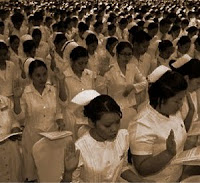Singapore water supply: the Philippines should take note and LEARN!
 Tiny Singapore has always played really well the bad hand dealt to it as far as natural resources go. One of its challenges is water supply. It is an island state with no natural ground water and few catchment areas. It's had to deal with a humbling reliance on Malaysia for much of the 1.36 billion litres per day it needs to satisfy the needs of its 4.4 million residents.
Tiny Singapore has always played really well the bad hand dealt to it as far as natural resources go. One of its challenges is water supply. It is an island state with no natural ground water and few catchment areas. It's had to deal with a humbling reliance on Malaysia for much of the 1.36 billion litres per day it needs to satisfy the needs of its 4.4 million residents.Unlike some countries however, Singaporeans don't manage by crisis...
As a first step, a string of massive reservoirs are being constructed to "harvest as much rain as possible", so that eventually, some two-thirds of the island's land surface will be under water, up from about half today, [Public Utilities Board Chief Executive Khoo Teng Chye] explains.
In addition, desalination plants that turn salt water into drinking water provide 10% of Singapore's current needs.
But the real breakthrough has come from what Mr Khoo describes as NEWater, produced in water reclamation plants from so-called "used" water.
Contrast this foresight to the primitivism of Filipinos where, according to an Earth Times News report on the water crisis faced by the Philippine capital today, 3.5 million residents suffer from an acute supply shortage. That's almost 80 percent of the population of Singapore.




The mixture of racial strains has led to traits, good or bad, we have today. Unfortunately, the lack foresight is one of such cultural traits and recently, the repercussions is being felt by 3.5M of the population. Sharing at the "Puta" wall.
ReplyDeleteThanks Ms Mike. And as long as this 3.5m are people who are not seen to be the sort of people who "matter", crises like this will simply be allowed to recur year in and year out in the same way that disasters that affect the poor primarily (ferry "mishaps", mudslides, etc.) have become routine facts of life in our society.
ReplyDeleteSingapore is a highly proactive society.
ReplyDeleteFilipinos, being reactive and fatalistic, always seem to prefer to let events take them wherever they will.
Filipinos, for instance only ended up having basketball decisively overtake all other sports (there was soccer and baseball everywhere back in the American period) when Peace Corps volunteers, armed by the embassy with basketballs and hoops, came in to play the sport with Filipinos in the barrios back in the 60's. It was that which got everyone looking almost exclusively at basketball.
Did Filipinos really choose that sport rationally or was it something that just "came to be" thanks to the socializing mission of American volunteers out to make friends?
Quite unfortunately, we haven't really excelled in the sport internationally, and yet here we are, a relatively short-in-stature people still blindly loving a height-favoring sport that doesn't love us back.
And while there are now attempts to introduce a rational discussion on shifting over to the more height-agnostic sport of Association Football (soccer), many Filipinos would just rather stick with the status quo that was THRUST UPON THEM or popularized among them by external forces (the Peace Corps volunteers), rather than chart a new course based on the full rational merits of doing so.
The same goes with the Presidential System. That system was bequeathed to us by the Americans. Did we really have much of a choice in that? No.
Well, now we do have a choice. A choice to shift over to a much better-evolved system that is more highly representative, more accountable, more efficient, and less prone to corruption, and yet opposition to such a move comes from people who prefer to stick with a faulty and highly-defective status quo system that was - yet again - bequeathed to us by fiat and not because we rationally decided that such a system was better than other available options.
It's almost as if Filipinos have this deathwish-like preference towards being forced to do something because of a life-and-death dilemma rather than making rational and calculated proactive decisions to change things while it is still early enough to do so in a more calm and orderly fashion.
This Water Crisis thing is just another manifestation of the inability to be proactive. The fact that some people *hint!* first preferred to shrug it off as "not being a crisis yet" shows that mentality of preferring to wait for the dam's water level to reach zero before calling attention or doing anything about it.
Sad. Very sad.
London has used "used" water for a long time. An oft-repeated saying is "Any glass of water drunk from the tap (faucet) in London has been through at least 8 pairs of kidneys.
ReplyDeleteThey're also starting to introduce the concept of recycling water in Australia and new houses being built are required to have rain water collection and storage systems incorporated into their designs.
ReplyDeleteIndeed, fatalistic is what describes a culture that would rather lay down and die than fight for control. Even if we don't win all (in fact, most) efforts at control, there is still nothing to gain by taking a resigned approach to regarding one's future.
Singaporeans make out of the little that they've got and that makes them really a genius. They are hardworking and smart as well.
ReplyDelete